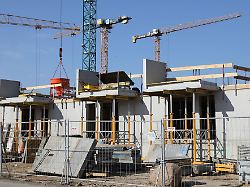Effective package of measures
IW sees potential for savings in construction costs
January 7, 2024, 8:24 a.m
Housing construction in Germany is stalling, and now interest rates and the prices for building materials are also rising. This makes construction projects more and more expensive. The Institute of Economics still sees opportunities to reduce construction costs.
In view of sharp increases in interest rates and building prices, the German Economic Institute (IW) is proposing a package of measures to reduce costs in housing construction. Because of the difficult situation in construction, it is important to improve the general conditions, according to a new IW report. “There is a risk of insolvencies among project developers and the construction industry, which could permanently reduce capacities,” warn the authors. Many savings are possible if there is a consensus in politics, administration and business about the importance of housing construction.
In order to estimate the factors influencing new building prices, the IW analyzed around 210,000 purchase and 365,000 rental offers for new apartments with two to five rooms. They were advertised between January 2018 and the end of July 2023. In addition to the prices, the IW took a close look at data on facilities, quality and location. The authors did not conduct a cost analysis, but rather examined which price premiums and discounts were associated with various housing characteristics.
Specifically, the IW sees opportunities for cost savings in equipment. For simple furnishings compared to the usual high-quality furnishings, there were price discounts of around 7.5 percent for rental offers and up to 15 percent for purchase advertisements. This offers a lot of potential, “especially since simple equipment in new buildings often far exceeds the typical standards in existing buildings.” The lack of underground parking spaces is also conservatively estimated to result in price reductions of 4 to 9 percent, while the lack of a basement has an impact of up to 2.5 percent.
Less area
Smaller apartments could also reduce new construction costs, write IW authors Michael Voigtländer and Christian Oberst. “Smaller apartments are associated with higher prices per square meter, but in absolute terms they lead to significantly lower prices per residential unit.” Another option could be apartments that are suitable for shared living – for young people in studies and training, but also for seniors, according to the IW. In general, the lack of space offers the greatest leverage for lower purchase and rental prices.
The public sector can also do something, according to the IW. “A reduction in the price of building land, or more precisely the cheaper sale of public land by 10 percent, is associated with a price reduction of almost 2 percent for purchase offers overall,” says the report. In the cities and for rents, however, the effect is only around 1 percent. Another lever is tax relief. “A suspension of the property transfer tax for new buildings would be compatible with EU law and appropriate in order to strengthen new residential construction.” Depending on the federal state, this would reduce costs by up to 6.5 percent. The real estate transfer tax is levied by the federal states, which earn billions from it – so there is little incentive to reduce it.
Housing construction in Germany has been stalling for a long time. The Ifo Institute estimates that only 225,000 apartments will be completed in 2024, compared to an estimated 270,000 last year. By 2025, the number of annual completions could fall even further to 200,000 apartments, believes DZ Bank. That would only be half as much as the traffic light coalition had planned. Construction Minister Klara Geywitz was recently optimistic. The housing market will probably brighten at the end of 2024 and beginning of 2025, said the SPD politician.
